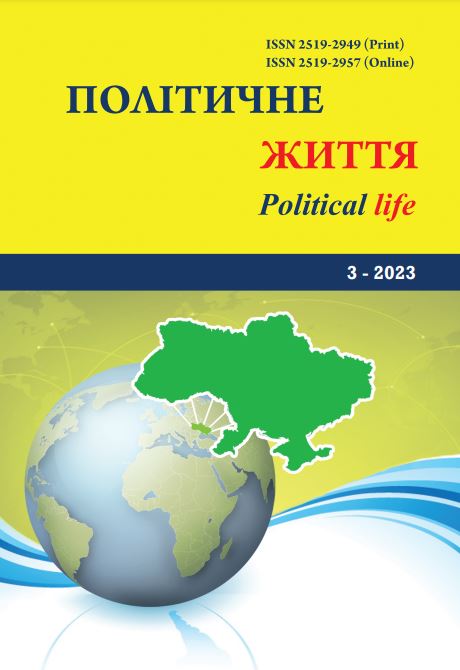The phenomenon of historical memory in modern Spain
DOI:
https://doi.org/10.31558/2519-2949.2023.3.9Keywords:
historical memory; Spain; national reconciliation; socialist government; Law on democratic memoryAbstract
The article dwells on the phenomenon of historical memory in theoretical and practical terms. It is noted that historical memory is an important means of forming a nation, national identity and national consciousness. It is indicated that the assessment of the past is a very fragile construct, which was established within the clash of political and corporate interests, ideological guidelines, and that its distortion or ignoring leads to the escalation of “memory wars” and further division of public space. It is proved that a joint idea of the past of their state is a vital basis for rallying the people on the way to solving the problems facing the state. Historical memory establishes not only the causal link from the past to the future through the modern, but also affects the assessment characteristics of the past, and the retrospective vision of our present.
The author analyzes the attitude to the past, its evaluation, using the example of Spain, which, among other things, went through a long and bloody Civil War and almost 40 years of authoritarian regime in the twentieth century. It is noted that the Spanish version of the transition from an authoritarian regime to democracy is exemplary. The mainstay of the Spanish democratic transit was the agreement of the leading political forces on national reconciliation, and the rejection of their ideological preferences and slogans during the transit. This arrangement was in effect for 30 years. It was the coming to power of the ISRP that gave impetus to a return to the reassessment of the historical past.The article analyzes the Law on Democratic Memory adopted by the socialist government, its extremely ideological orientation, its challenges and threats to the social stability of modern Spain.
References
Саух П.Ю. Історія: пам’ять минулого чи уроки майбутнього? // Волинські історичні записки. 2008. №1. С.7-15.
José Ortega y Gasset. La España invertebrada. 1921.
Samuel P. Huntington. The Third Wave: Democratization in the Late Twentieth Century. 1991. 318 p,
Benito Alarcon Juan. Francisco Franco y su tiempo. Madrid: Edisiones fraile, S.A., 1983. 237 p.
Bennassar Bartolome. Franco. Madrid: EDAF, 1996. 367 р.
Borras Betriu Rafael. Los ultimos Borbones. De Don Alfonso ХІІІ al Principe Felipe. Barcelona: Flor del Viento Ediciones, S.A., 1999. 490 p.
Marin Jose Maria, Molinero Carme, Ysas Pere. Historia politica de España 1939-2000. Madrid: Ediciones Istmo, S.A., 2001. 511 p.
Historia de España siglo XX. 1939-1996 // Coopd. Martinez Jesus A. Madrid: Catedra, 2003. 519 p.
Іваницька О.П. Іститут монархії як гарант демократичного транзиту в Іспанії. Політичне життя. 2021. №2. С. 16-25.
Толстов, С.В. Досвід національного примирення в Іспанії. Європейська і світова практика досягнення консенсусу та національної єдності: алгоритм для України. Аналітична доповідь. 2017. с. 19-24.
Розенберг Даніела. Непевні шляхи національного примирення. Політичне побутування франкістського минулого. Україна модерна. 2009. 315. С.103-116.
Ley 20/2022, de 19 octubre, de Memoria Democratica. Boletin oficial del Estado. №252 de 20 octubre de 2022
Pio Mio. Los Mitos de la Guerra Civil. Madrid: La Esfera de los Libros, 2003. 605 p.

